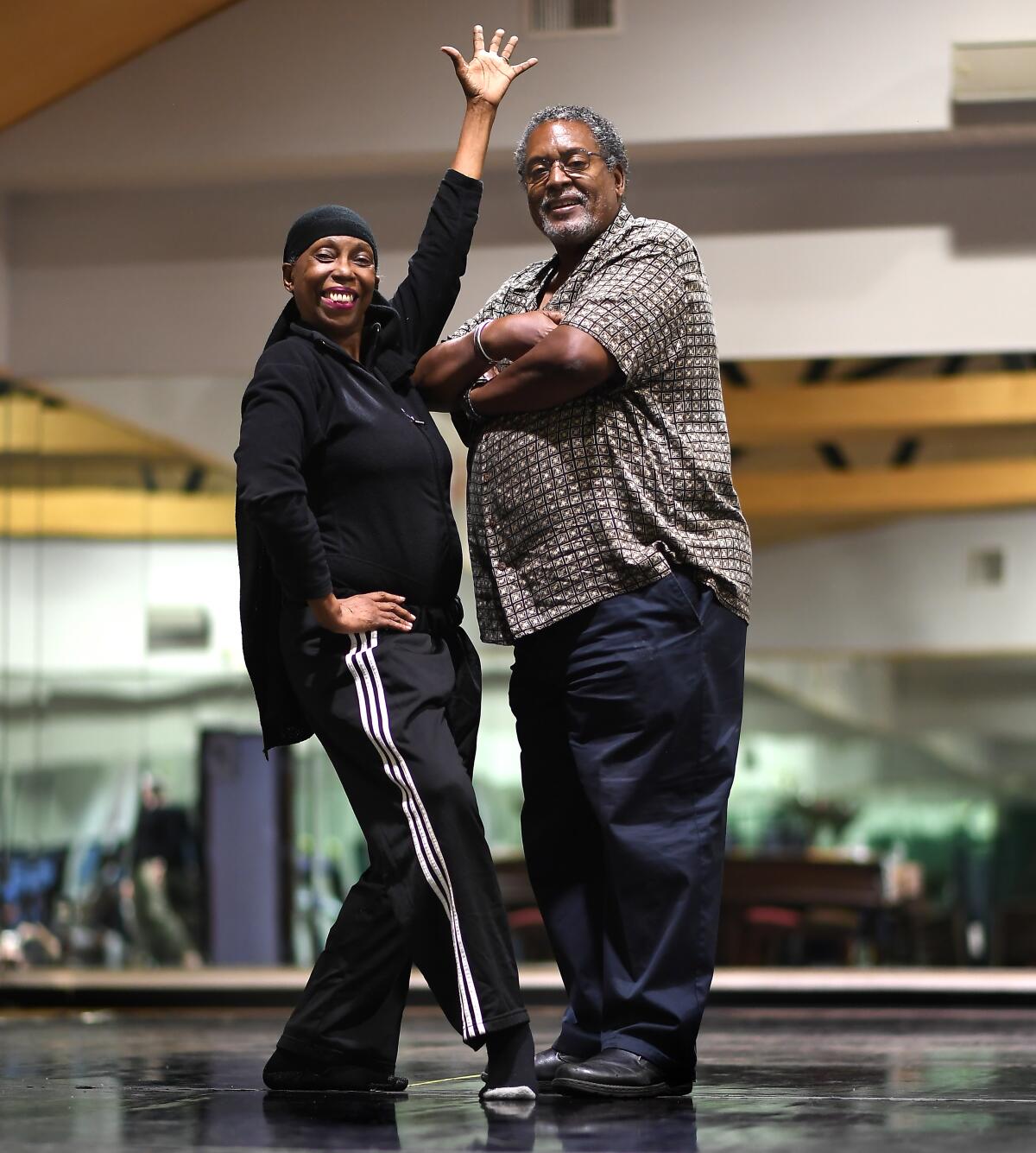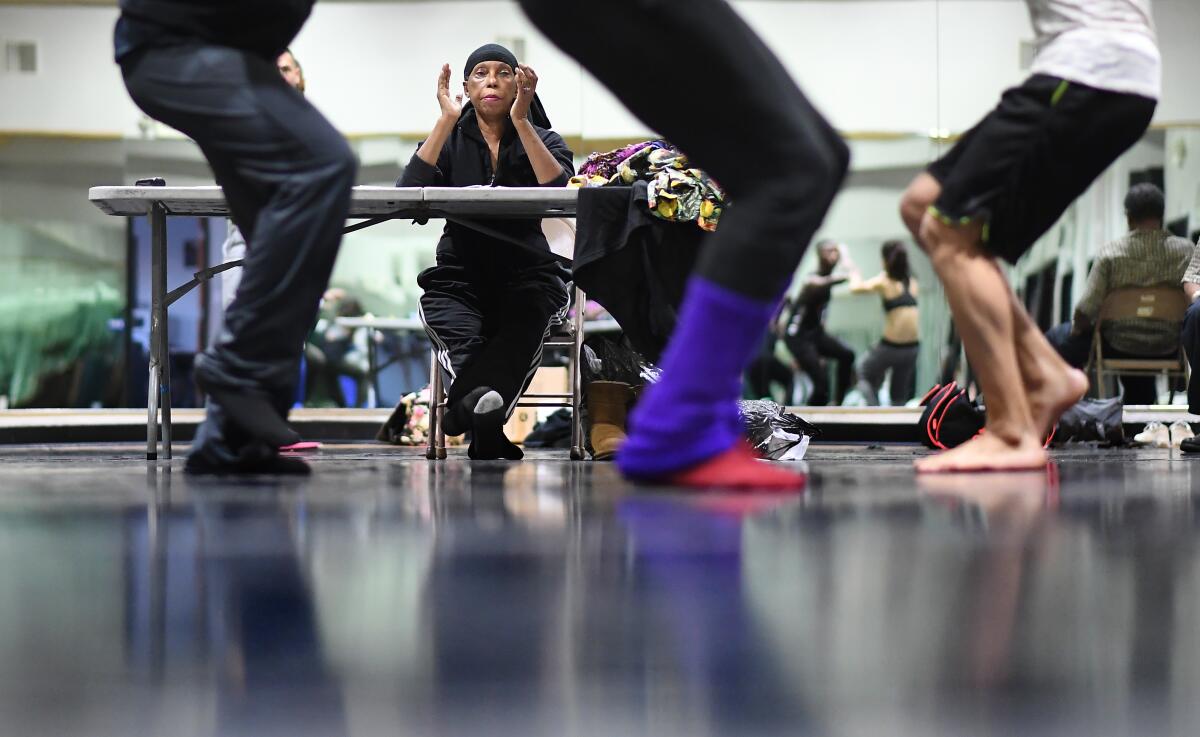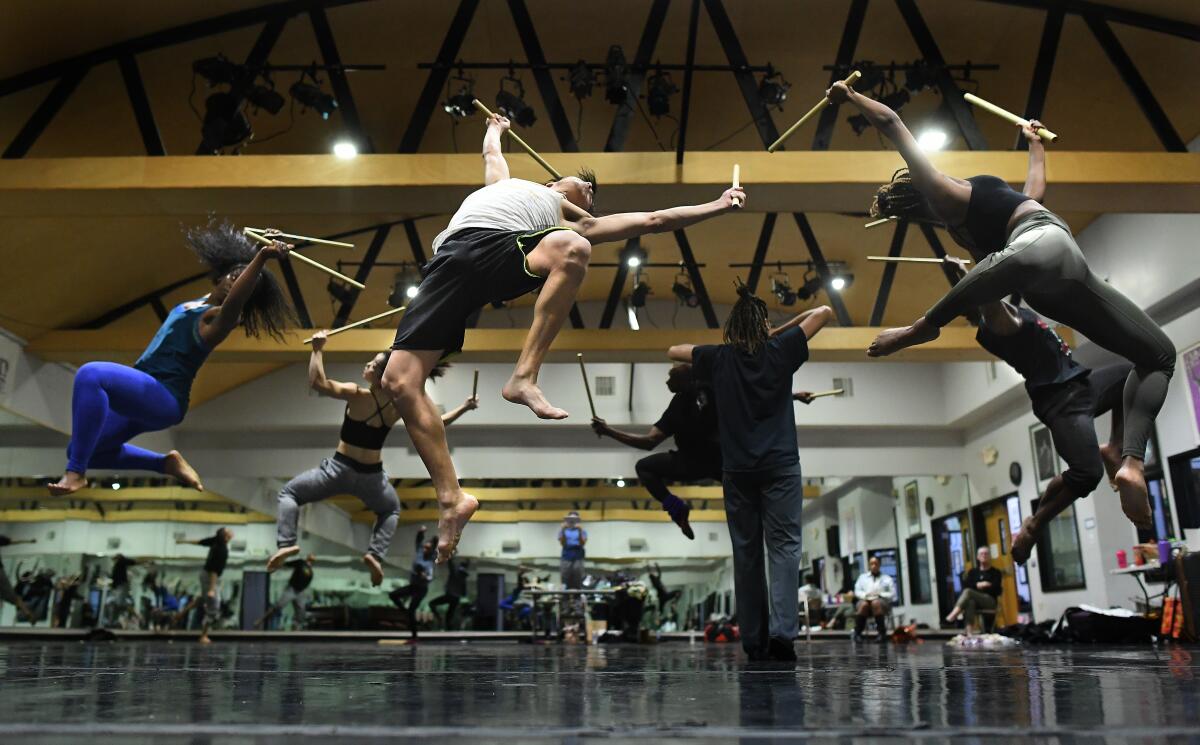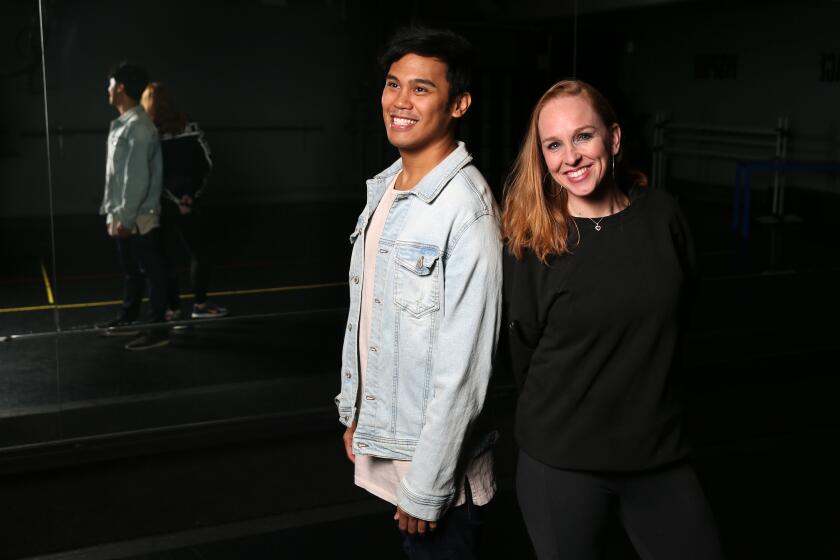For 40 tough years, this couple’s devotion has kept their dance company on its feet

- Share via
Even after 40 years of running a dance company together, Lula and Erwin Washington still disagree on the value of critics.
At their Lula Washington Dance Theatre headquarters on Crenshaw Boulevard, the two debated the topic in their office filled with promotional posters from past shows. Erwin reflected on early reviews of Lula’s choreography in The Times, which he described as “sometimes awful.”
He eventually figured out that audiences loved the shows that critics ripped apart, and he would encourage Lula to add at least one “intellectual, ethereal, experimental” work to appease them.
As the company’s executive director and grant writer, Erwin reasoned that good reviews could lead to additional funding. But for artistic director Lula, West Coast critics never took time to understand her work, a fusion of modern, hip-hop, jazz and African movement. She still wonders if there is a space for critics today.
“I think critics are needed,” Erwin said.
“That’s your opinion, not mine,” Lula quipped.
Both are 69 now. As the wife and husband who founded the Los Angeles dance company in 1980, the two continue to strike the delicate balance between artist and administrator, between ambitiously creative and cautiously pragmatic.
Lula is the boss, Erwin said. “When we get together, it can get,” he said, trailing off. “Well, usually I give up, I let her have her way. I learned that’s the way you stay married.”
On their 50th wedding anniversary — they married in 1970 after meeting at a South L.A. high school — the company was in rehearsals all day, gearing up for its weekend performance at the Wallis Annenberg Center for the Performing Arts.
A celebration of the company’s 40th anniversary, the performance includes works by Lula, street dance choreographer Rennie Harris and Tommie-Waheed Evans. The program features a tribute to Lula that also symbolizes the couple’s relationship, choreographed by former Alvin Ailey company member Christopher Huggins.
It wasn’t unusual for rehearsals to take priority in the relationship. “We put the company first above everything,” Erwin said. “I don’t think either of us has regretted this.”

At a recent rehearsal at their Crenshaw space, Lula discussed formations with her cast of dancers for an energetic afrobeats dance. Watching in the background, Erwin described how he discovered the work online and commissioned it from Canadian choreographer Esie Mensah, after getting approval from Lula.
When the Washingtons started the company in 1980, they had to borrow money for rehearsal space. “We didn’t have a permanent place to work,” Lula said. “No one was paid, costumes came out of my closet — some still do. And dancers came because they wanted the experience of working in a company.”
At the time, Erwin was a working playwright and journalist, writing for outlets including The Times and Time Magazine. He never imagined he’d become a full-time arts administrator.
But in the late 1980s when he was working for the L.A. Daily News, he traveled to Massachusetts for the Jacob’s Pillow dance festival with the company, staying longer than his allotted vacation time at work. “When I came back, my editors made fun of dance and they treated it as something effeminate and something that I had no business doing,” he recalled. “I cursed them out and walked out.”
He was spending more and more time working on the company’s publicity and marketing, and after winning a grant that provided him a small salary, a fraction of what he made as a reporter, Erwin left journalism. He believed in what Lula was doing.
While Lula led the artistic vision of the company, choreographing and performing, Erwin led administration and management.
Lula was front and center, “but I was comfortable where I was,” Erwin said. “It wasn’t about money, it was about the fulfillment that I was feeling from helping to build something.”
“I’ve watched them go against the grain,” the company’s associate director, Tamica Washington-Miller, said about her parents. “These two from South L.A. got their education, went to UCLA and figured out how to make a way, something that’s their own and unique.”
At Revolution Dance in Montrose, ‘Ocean Eyes’ launched Billie Eilish and ‘Once Upon a Time ... in Hollywood’ breakout Julia Butters learned to love the stage.
Lula recalled advice from the late modern choreographer Alvin Ailey as she worked to establish Lula Washington Dance Theatre (then called Los Angeles Contemporary Dance Theatre) in its early days. Starting a modern dance company in L.A. “was one of the most difficult things to do,” Ailey told her.
But he offered a few survival tips. One: “If you have a chance to buy your studio, buy it.”
Owning space — where the company holds rehearsals, offers dance classes and an after school program — is one of Lula’s proudest accomplishments.
By marshaling community resources and mortgaging their home, the couple bought a West Adams space for $225,000 in 1989. They suffered a blow in 1994 when the building was closed by the Northridge earthquake.
After a three-year legal battle, Erwin successfully petitioned to use Federal Emergency Management Agency money to buy a new building, which became the company’s Crenshaw home. Its estimated value is about $1.8 million, he said.
Another piece of Ailey advice: have benefactors — “people that want to support the company no matter what,” Lula recalled.
Finding patrons has been a 40-year quest.
The company has become a cultural force in L.A. presenting work rooted in the black experience. It now pays dancers for performances but not nearly enough to live on, Lula and Erwin said. They’ve performed at the Joyce Theater and Lincoln Center in New York, at the Kennedy Center in D.C. and in countries including Mexico, Germany and Spain.

But the struggle to stay afloat is still fierce.
“You have to learn to tread water,” Lula said. “Most of the dance community is in starvation mode here. We’re all hanging on.”
As the two get older, Erwin contemplated how the company’s legacy will continue.
“Even if it’s just the two of us left, even if everybody else failed us, the two of us can run it by ourselves,” Erwin said.
But in the days where there won’t be “a two of us,” Erwin continued, “we’re trying to figure out how to build and finance an infrastructure to make it more of an institution and make it sustainable long-term.”
Lula Washington Dance Theatre
Where: Wallis Annenberg Center for the Performing Arts, 9390 N. Santa Monica Blvd., Beverly Hills
When: 7:30 p.m. Friday-Saturday
Tickets: $29-$79
Info: thewallis.org
More to Read
The biggest entertainment stories
Get our big stories about Hollywood, film, television, music, arts, culture and more right in your inbox as soon as they publish.
You may occasionally receive promotional content from the Los Angeles Times.












